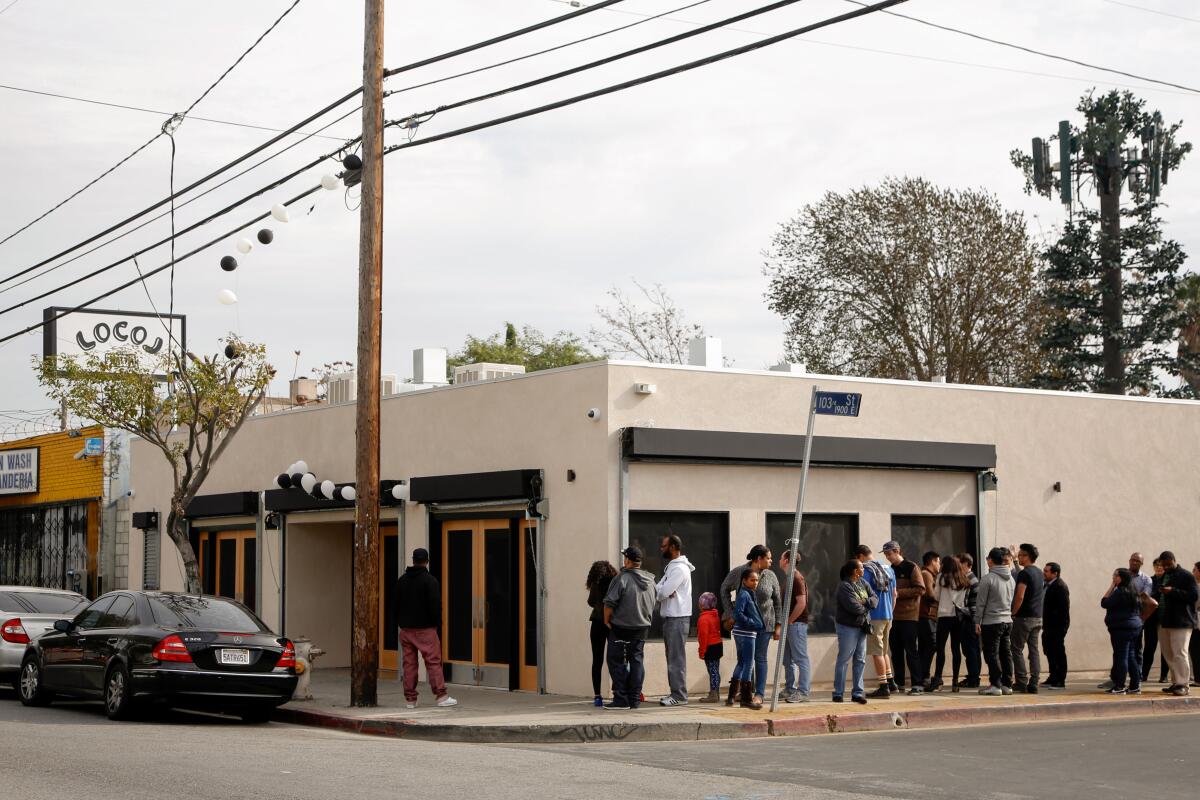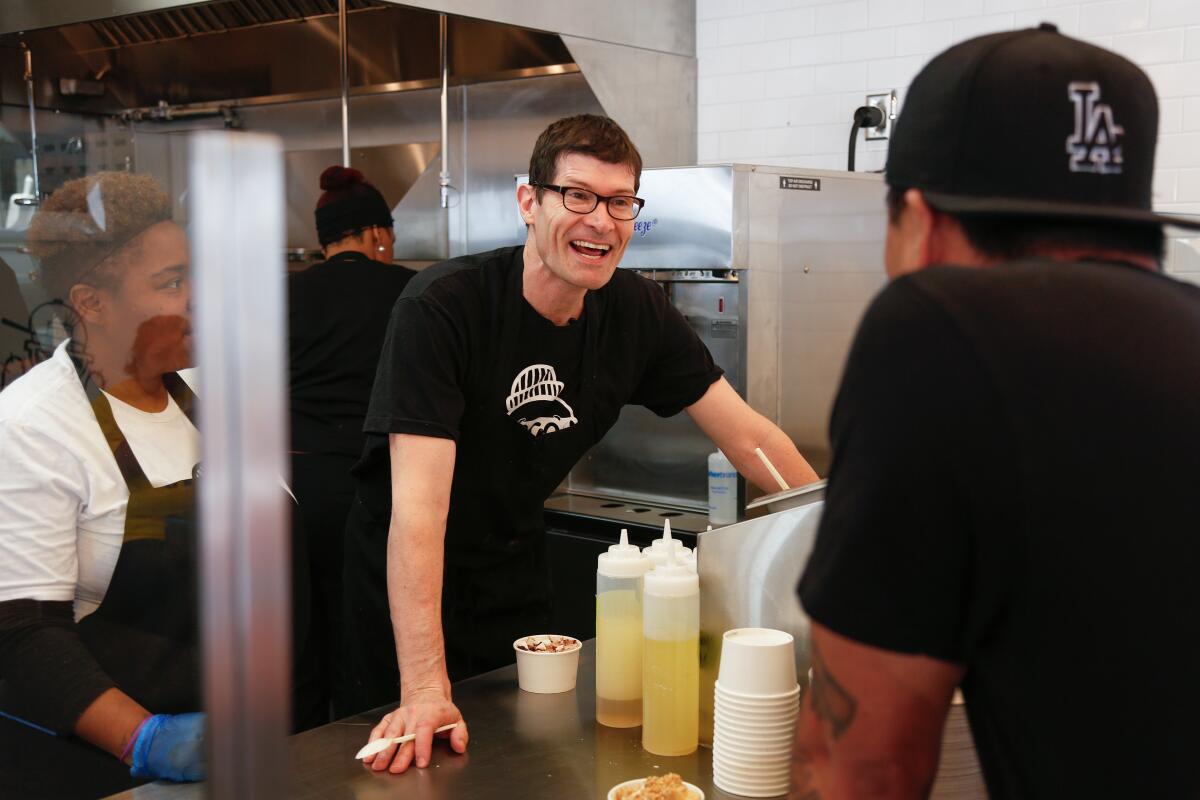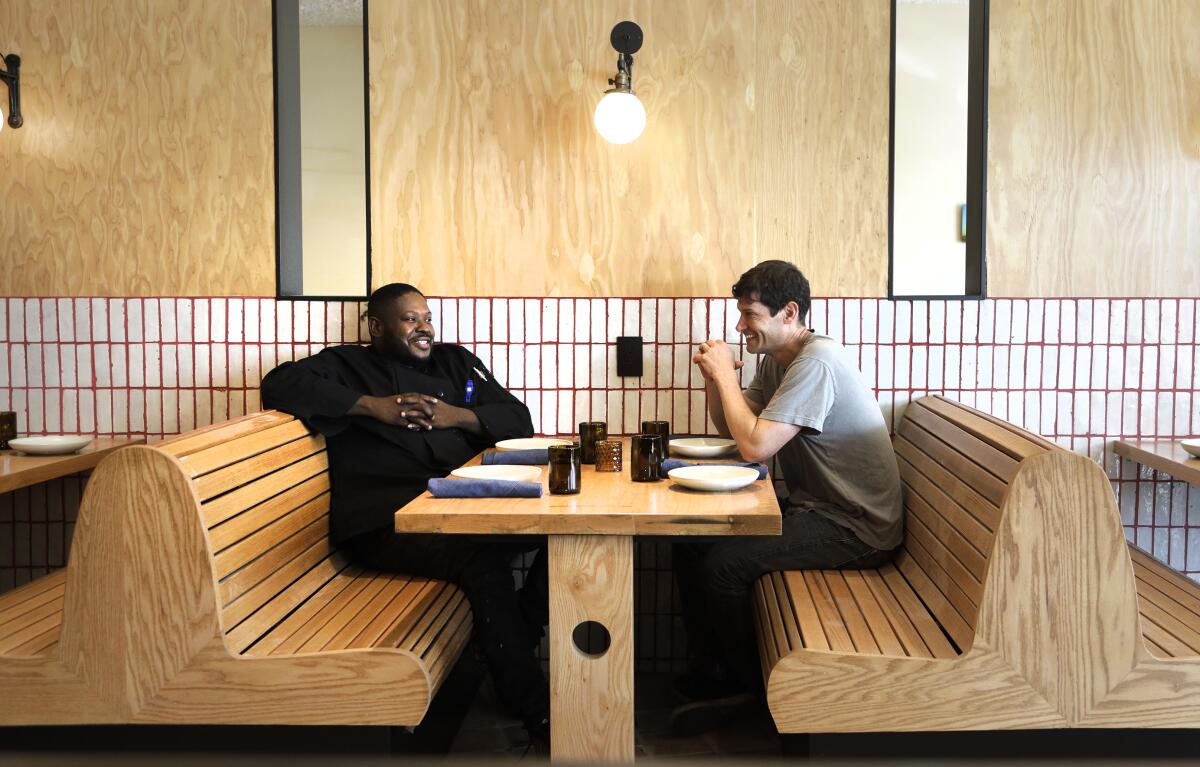Community-focused Locol rises again in Watts, this time as a nonprofit restaurant

- Share via
Locol, the groundbreaking, community-focused restaurant that closed five years ago, is set to reopen in its original Watts location — this time as a nonprofit organization.
Daniel Patterson, the chef and entrepreneur who co-founded L.A.’s Alta Adams, and Keith Corbin, the co-founder and executive chef of Alta Adams, plan to start hosting pop-ups in the space later this summer, then open in the fall with a new menu, more educational outreach and a training program for members of the Watts community.
Locol, named the L.A. Times Restaurant of the Year in 2017, was founded by celebrity chefs Patterson, formerly of multiple Bay Area fine dining institutions, including Coi, which at one point earned three Michelin stars, and Roy Choi, TV host and founder of the Kogi food truck empire. Together they sought to create a new model for helping the community through food service and vocational training.
Serving what L.A. Times critic Jonathan Gold called “not a replacement for fast food, but a better version of it,” Locol offered what was intended as healthier, affordable vegetable bowls, grain-enriched burgers, chili and chopped salads that topped out around $8 in an effort to serve what by and large remains an underserved food neighborhood. When it shuttered in 2018, the chain’s closures made national headlines.
“Every dish that’s successful is built on the bones of hundreds of ones that weren’t,” Patterson told The Times this month. “If you don’t give up, a lot of times you have a chance to find a different way to get back to it. We never stopped talking about it.”

Although Choi is no longer involved, Patterson and Corbin — a Watts native who got his start in the restaurant business as a line cook, then kitchen manager at Locol — plan to run a quick-service restaurant and educational training center in the same 103rd Street space it used to operate.
“We’ve had a lot of time to look at what it is that did work, and what was so powerful was vocational training and empowering people,” Patterson said. “So we want that to be the focus.”
Corbin and Patterson are applying for Locol’s 5013(c) designation, and in the meantime work with Fiscal Sponsorship Allies, a nonprofit that aggregates donations to organizations. To raise money, their West Adams restaurant, Alta Adams, began donating 1% of its revenue in the spring, while a bimonthly Monday dinner series there donates a portion of its proceeds to the reopening efforts.
Both chefs hope that running Locol as a nonprofit will help increase their access to those who need quality food and nutrition education.
There are many factors to consider in choosing a Los Angeles Times Restaurant of the Year.
“Watts is about 2.2 square miles that’s geographically divided up to the gangs and the projects, so wherever you land as a retail or for-profit [operation], you can only service about one fourth of the community,” Corbin said. “If there’s 40,000 people in that community and you only have 10,000, how many of those are children? How many of those are drug addicts? How many of those are on fixed income? It just doesn’t work. But as a nonprofit, or through a school, you have a chance to reach that entirety.”
Corbin already works with KIPP Philosophers Academy and is reaching out to possible schools and other community organizations to help develop classes on culinary skills, nutrition or home economics. In 2011 Patterson founded the Cooking Project, an initiative that teaches young children how to cook, which he wants to run in concert with Locol.
Community feedback informed the chefs that the neighborhood wanted soul food and barbecue during the last iteration — and not necessarily a reimagined version of fast food. This, among other pitfalls, was most likely a contributing factor to Locol’s 2018 end.
By the time the groundbreaking restaurant had opened its Watts flagship in early 2016, lines ran out the door and down the block. In addition to naming Locol the 2017 L.A. Times Restaurant of the Year, Gold awarded it a space on the 101 List. Food & Wine, too, named it a restaurant of the year.
The same star power that helped propel Locol to national attention and praise could have contributed to its downfall, Patterson and Corbin recently said, with too much pressure and a false expectation set by Patterson’s Michelin-starred reputation and Choi’s lauded Kogi legacy. That focus on the fame of its founders and their other, more long-running successes, helped shape the narrative of Locol as a failure when its locations began to shutter.
In 2017 the Oakland location’s zero-star review from New York Times critic Pete Wells shocked the restaurant community in L.A. and beyond, spurring backlash on social media, an op-ed and even the L.A. Times’ own Jonathan Gold questioning the worth or reason of the “ungenerous” critique.
Locol shut down slowly, with all locations closing in 2018 before the company turned its focus to catering. Eventually that ceased, too, but a new company from Choi — called Chewbox — revived its food with delivery service. Chewbox recently vacated the former Locol space in Watts. Patterson said that the collective decision to close Locol, one at a time, was made as its chefs and investors ran out of funding.

Corbin doesn’t think they’ve overcome the trauma of closing the last iteration of Locol yet; that’s why they’ve been talking about its reprisal for years. Still, neither he nor Patterson see the 2018 closures as a failure given how many lives they say Locol changed, including Corbin’s own and a number of former trainees he is still in contact with — some of whom work with both chefs in the kitchen today. Alta Adams and its corresponding coffee shop opened in 2018 with a half dozen former Locol employees, and continues to staff them.
“Trust me, it changed the community,” Corbin said. “It’s taken many people like me out of the equation; Locol dealt with the rough of the rough.”
Two former Locol customers, he says, were in rival gangs and personally shooting at each other before they began training at the restaurant. They were able to eventually work together and to this day, Corbin said, both are still off the streets.
At the time of Locol’s closure the restaurants’ lead investor, venture capitalist Stephen DeBerry, cited the storefronts’ financial unprofitability — something that Corbin and Patterson hope can be avoided by running Locol as a nonprofit as opposed to a for-profit chain this time around.
“We’re going to do our best to run a restaurant that’s a responsible business because that’s what we believe people will learn,” Patterson said. “But we’re not like, ‘You have to have a 25% food cost.’ It’s a nonprofit. So if [food cost] goes high, we’ll use it as a learning point but we’re not going to stress about it. We don’t have to squeeze every dollar out of everything that comes in.”
Costs have dramatically risen since Locol’s last run. To offset this, they hope to work with their vendors through some farms’ more charitable branches, like those offering discounts and donated foods.
Opening this week of LocoL by chefs Roy Choi and Daniel Patterson - Katie Falkenberg / Los Angeles Times
While still finalizing a framework and curriculum for the restaurant’s training program, they said it might involve three months of working in the kitchen, plus three months working registers and front-of-house service, with placement programs into other restaurants and career avenues after graduation, and ideally some kind of support system.
“Sometimes you have to walk the journey with them, like Daniel did with me,” Corbin said. If Locol expands, they dream of offering a management-focused program for trainees to learn what goes into running a business such as management of employees, HR, general communications and cash handling — all skills that Corbin says he had to learn.
Even given a new framework, the years of experience, and a small legion of supporters and Locol alumni in support, both Patterson and Corbin are aware that Locol could very well close again, even as a nonprofit.
“We’re gonna do our best,” Patterson said. “We’re gonna smile and meet challenges as they come up, and we might fail again! Who knows. But we’ll try not to.”
“That’s always an option,” Corbin said.
“But one thing I will say,” Patterson added, “is we’re stubborn as f—.”
More to Read
Eat your way across L.A.
Get our weekly Tasting Notes newsletter for reviews, news and more.
You may occasionally receive promotional content from the Los Angeles Times.









